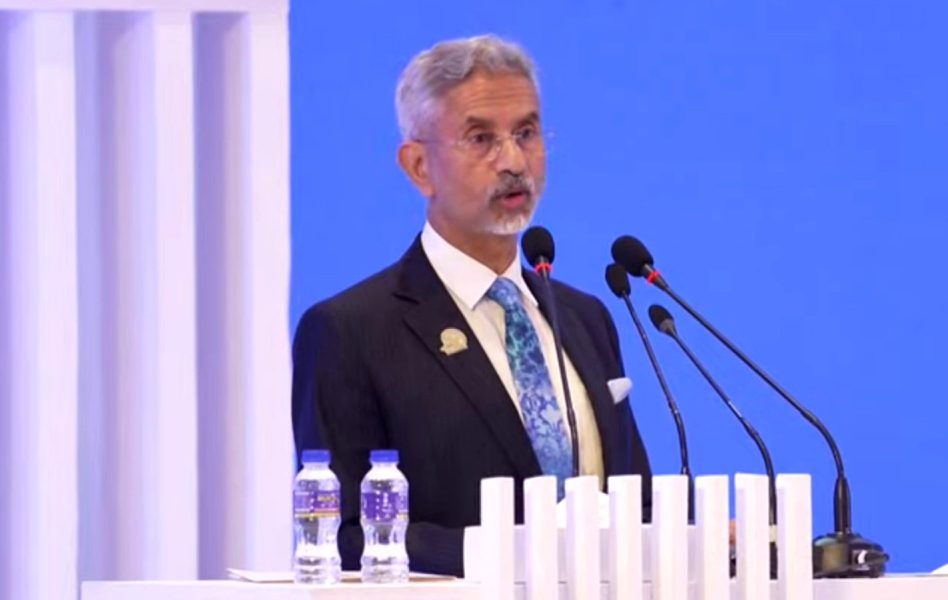
EAM Jaishankar: When nations violate agreements, damage to trust and confidence is immense

In a veiled dig at China, External Affairs Minister S Jaishankar said on Friday that when nations disregard their legal obligations or violate longstanding agreements, the damage to trust and confidence is immense.
Addressing the 6th Indian Ocean Conference here in the Bangladeshi capital, he also said a significant shared concern through the Indian Ocean is that of unsustainable debt generated by unviable projects.
The importance of adhering to the law, observing norms and respecting rules is a natural convergence point, he said, adding that it is not possible to build a stable international order without these prerequisites.
“This is especially so in a continent that has seen so much growth and so much change. When nations disregard legal obligations or violate long-standing agreements. As we have seen, the damage to trust and confidence is immense,” he said, apparently referring to China’s violation of border pacts with India.
“It is therefore essential that all of us take the long view of our cooperation, rather than a tactical one of our interests,” he said.
India has been slamming Chinas deployment of a massive number of troops and its aggressive behaviour along the Line of Actual Control in eastern Ladakh in violation of pacts on border management.
India has firmly told China that its violation of the border pacts has eroded the entire basis of bilateral ties and that all issues relating to the frontier must be resolved in accordance with the existing agreements.
Jaishankar said a significant shared concern through the Indian Ocean is that of unsustainable debt generated by unviable projects.
“There are lessons from the last two decades that we ignore at our peril. If we encourage opaque lending practices, exorbitant ventures and price points that are unrelated to the market, these are bound to bite us back sooner rather than later.
“Especially so when sovereign guarantees have been proffered, not always with due diligence. Many of us in the region are today confronting the consequences of our past choices,” he said.
Chinas unproductive projects in Sri Lanka, including the Hambantota port, which Beijing took over on a 99-year lease as a debt swap, have come under sharp criticism.
China, which accounts for 10 per cent of Sri Lanka’s debt, is reported to have resisted offering a debt cut.
He said this was a time to reflect and reform, not to repeat and reiterate.
He said Indo-Pacific is a reality and becoming more so with each passing day.
“It is a statement of our contemporary globalisation and underlining that we are getting past the framework of 1945. There are obviously nations that have a vested interest in perpetuating the past. As indeed they have in larger international relations, including the structure of the United Nations,” he said.
He said because the world is understandably seized by the larger domain of the Indo-Pacific, the countries should not underplay the issues and challenges of one of its core constituents the nations of the Indian Ocean.
While highlighting the importance of smooth and effective connectivity, Jaishankar said countries need to respect sovereignty and territorial integrity.
India has been opposing the USD 60 billion China-Pakistan Economic Corridor as it passes through Pakistan-occupied Kashmir, giving China access to the Arabian Sea through the Gwadar port in Pakistan’s Balochistan province.
Jaishankar said there are some global challenges that also merit regional considerations, especially climate action and counter-terrorism.
“The universality of these concerns is by now well recognised. It is essential that our conversations aim to encourage common positions. We must also be conscious of the threats to the social fabric posed by extremism and fundamentalism taking advantage of democratic openness. The costs of not doing so are also starkly apparent to all of us today,” he said.
Jaishankar said India is committed to the well-being and progress of all nations of the Indian Ocean.
“We believe that a seamless transition into an Indo-Pacific is to our collective advantage,” he said.
The US, India and several other world powers have been talking about the need to ensure a free, open and thriving Indo-Pacific in the backdrop of China’s rising military manoeuvring in the resource-rich region.
China claims nearly all of the disputed South China Sea, though Taiwan, the Philippines, Brunei, Malaysia and Vietnam all claim parts of it. Beijing has built artificial islands and military installations in the South China Sea. China also has territorial disputes with Japan in the East China Sea.
Jaishankar is visiting Dhaka to participate in the 6th edition of the Indian Ocean Conference which is being attended by President of Mauritius Prithvirajsing Roopun, Vice President of Maldives Faisal Naseem, Prime Minister of Bangladesh Sheikh Hasina, and several ministers from across the world.
(Except for the headline, this story has not been edited by The Federal staff and is auto-published from a syndicated feed.)

